The choice of the topic was a meaningful part of the project as it preconditioned data collection and the use of specific articles. The given issue is interesting for me, which means that I am highly motivated to acquire improved outcomes. Additionally, I remember a discussion about this very issue and its significance for the modern sphere of education. For this reason, I think that this topic is both relevant and important at the same time, which makes it attractive to me.
Purpose, Background, and Importance
- Purpose: The purpose of the study is to investigate whether parental involvement plays a role in elementary school student achievement
- Background: Parent involvement a vital component in early childhood education that should be given the highest level of attention by educators with the primary goal to achieve acceptable grades
- Importance: Parent involvement has been shown to play a crucial factor in elementary school student learning. If parents are not involved, whether at home or in school, the student’s academics achievement is affected. This study investigates the importance of this aspect and its impact on outcomes
During the course, we learned about the importance of these aspects for any project as they predetermine its outcomes. Speaking about the purpose, background, and importance, I should say that all these elements are vital and should be given specific attention. However, for me, the importance of the study becomes the major motivator to work on it and collect information related to parent involvement as the factor promoting better results.
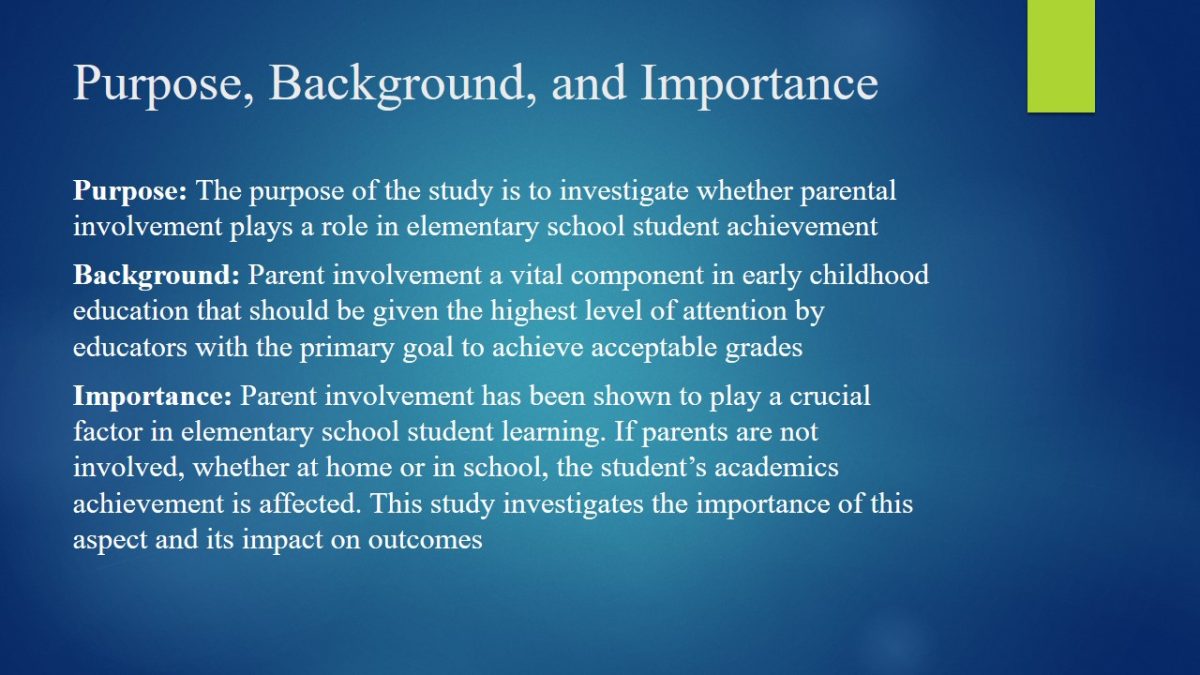
Lara, L., & Saracostti, M. (2019). Effect of parental involvement on children’s academic achievement in Chile. Frontiers in Psychology, 10, 1464.
- Purpose: To analyze the correlation between parental involvement in school and children’s academic successes.
- Research question: Whether there is an association between different levels of parental involvement and children’s achievements in school.
- Approach: Qualitative.
I found this article trying to collect information about the correlation between parental involvement and academic achievement. Regardless of the fact that investigators use Chile as the setting for their study, I think results remain applicable to other countries because of the universal character of the problem and the prior purpose of this article. I also found this paper a relevant and appropriate source of credible information related to the topic under investigation.
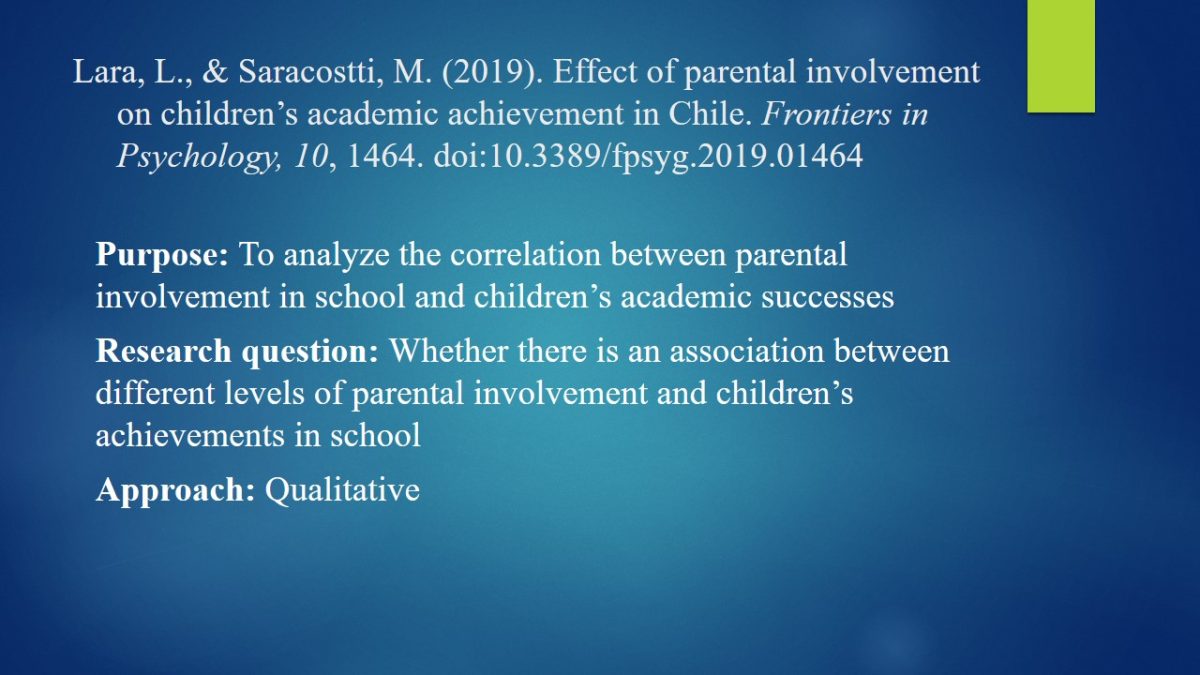
Participants, Settings, Measures
- Participants: 498 parents or guardians whose children attended second and third grades in 16 public elementary schools in Chile.
- Settings: Elementary schools in Chile.
- Measures: Five scales proposed by Hover-Dempsey and Sandler to measure the level of parent involvement and its impact on children academic successes in selected schools and grades
I like that researchers use several scales to measure the level of parent involvement and how it can impact children and their successes. I think it is a good way to collect credible information related to the issue and conclude about the problems associated with a particular question. Additionally, the high number of participants means that data will be more accurate and help to acquire an improved understanding of the current situation regarding the topic under discussion.
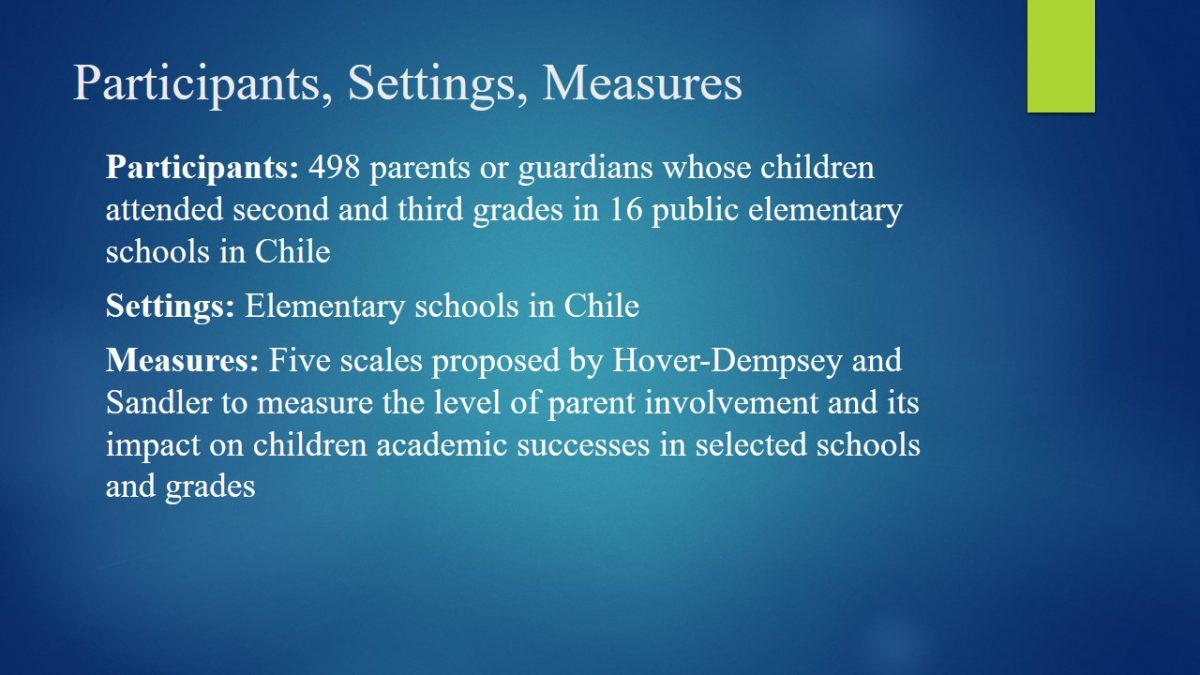
Key findings
- There was a direct correlation between parent involvement and children academic successes.
- The higher level of involvement resulted in better outcomes, and, at the same time, low participation rates might precondition the emergence and development of problems with understanding and achievements.
- Low involved parents scored below the mean in all measures, which evidenced the importance of this aspect for results and children successes.
Speaking about key findings, I like that the researchers managed to outline the existence of the direct correlation between parent involvement and child academic successes. It means that using relevant data, they justify the importance of this aspect. Moreover, they offer differences between high, middle, and low involvement levels, which is also significant for our research project. In such a way, I believe these findings should be viewed as credible and relevant and included in the final paper.
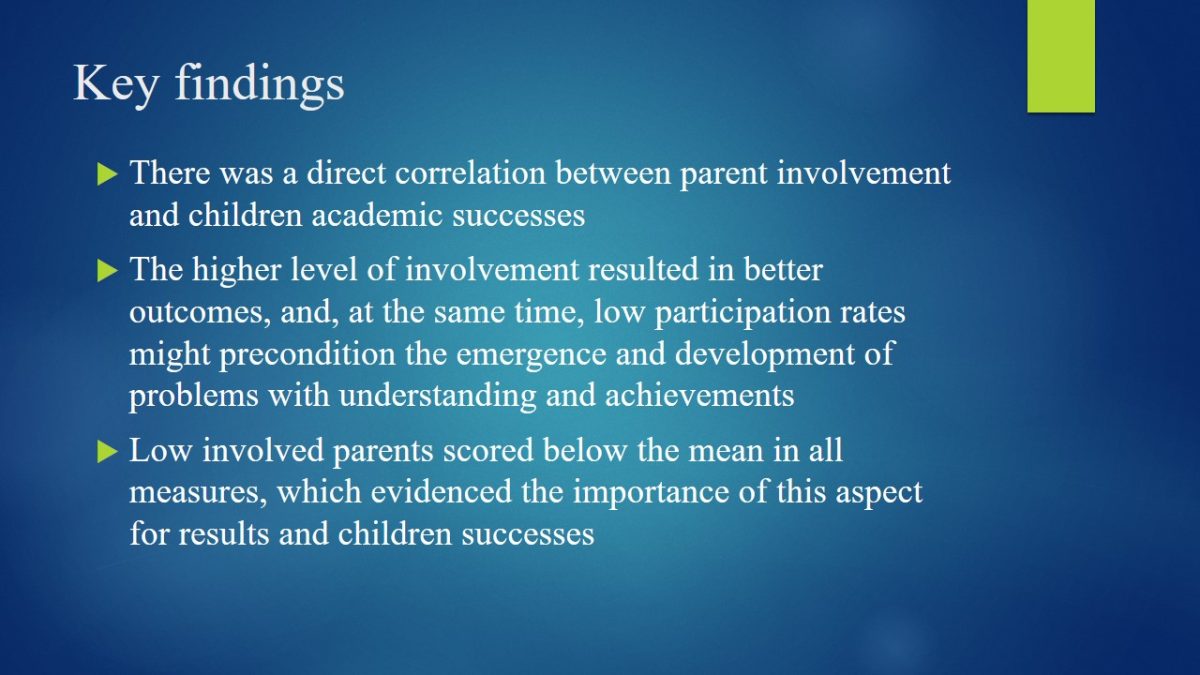
Duan, W., Guan, Y., & Bu, H. (2018). The effect of parental involvement and socioeconomic status on junior school students’ academic achievement and school behavior in China. Frontiers in Psychology, 9, 952. Web.
- Purpose: To outline the moderating role of socioeconomic status and parental involvement in promoting better academic achievement in junior school students.
- Hypothesis: Socioeconomic status negatively moderates the relationship between parental involvement and junior school students’ performance.
- Approach: Quantitative.
I like that the authors offer a clear hypothesis stating that the socioeconomic status of families might affect the correlation between parent involvement and students’ performance. I am sure that the level of households’ income should be considered as one of the factors influencing children and their studying, which means that the paper offers a meaningful perspective on the problem. Moreover, it provides information about another dimension of the discussed theme, which is vital for the credibility of findings.
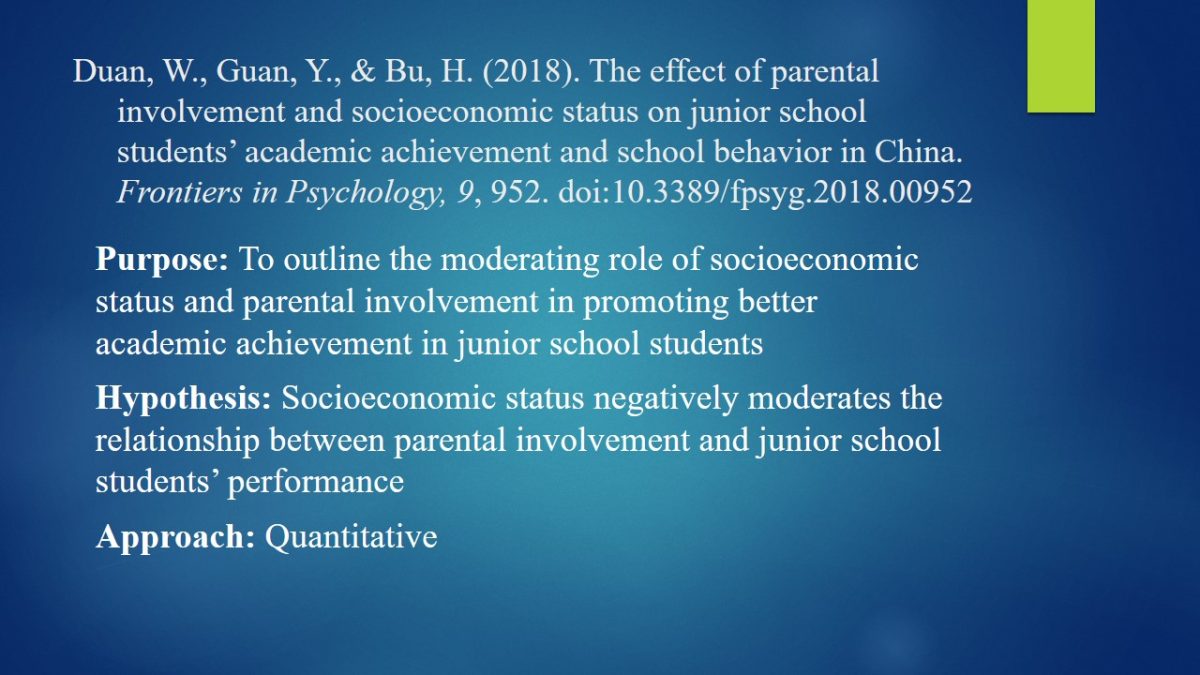
Participants, Settings, Measures
- Participants: 19,487 Chinese junior school students and their parents were involved in the research to collect needed data.
- Settings: Chinese elementary schools.
- Measures: To study home-based involvement and academic socialization as the predictors of parental involvement.
I found that measures selected by the researchers are really important for the topic. For instance, reading the paper, I discovered that home-based involvement is critical when speaking about parental involvement and adults’ readiness to help their children with their studies. For this reason, I enjoyed the article and decided to include it in the analysis. The information presented by the authors is valuable and important for the project.
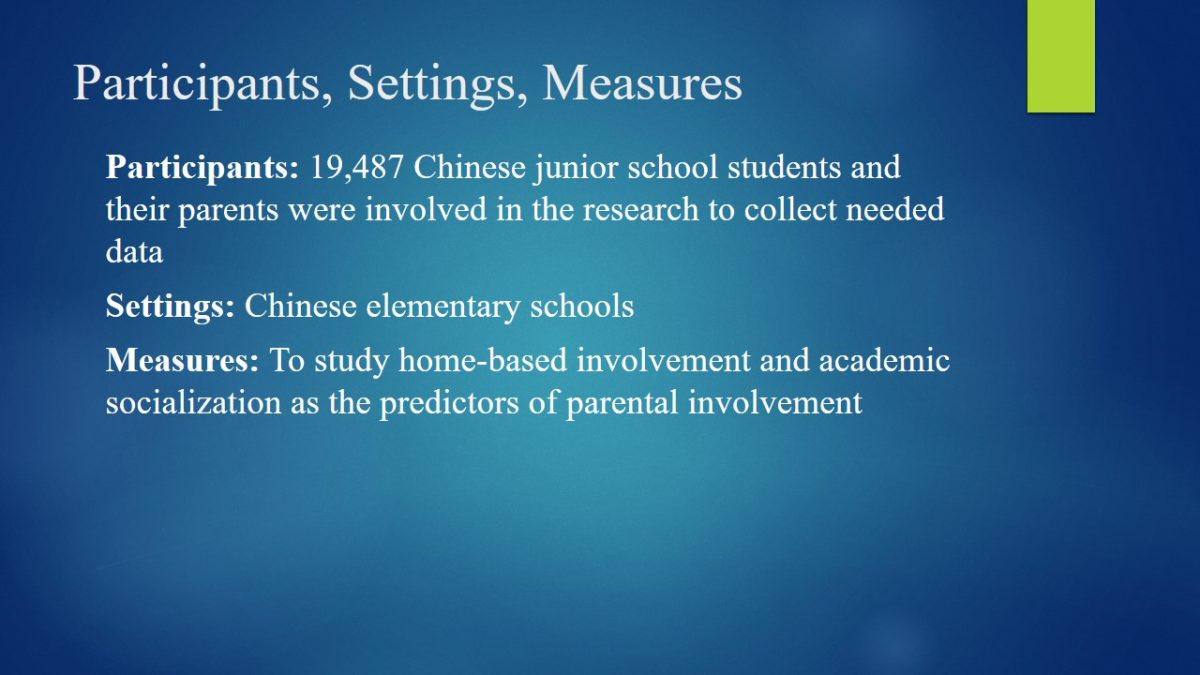
Key findings
- The study revealed that low parent involvement negatively impacts academic socialization and success among students.
- Socioeconomic status (SES) of families should be considered an important factor influencing parental involvement and adolescents readiness to help their children.
- Children in low-SES families faced greater challenges, which preconditioned the need for additional attention from their parents.
Speaking about findings, I like that the authors devote their attention to low-SES families and challenges children belonging to these households face. Speaking about parent involvement, it is vital to consider all factors that might affect it. That is why I like the idea of including SES in the research and correlating it with parents’ desire or ability to help their children in achieving success in school.
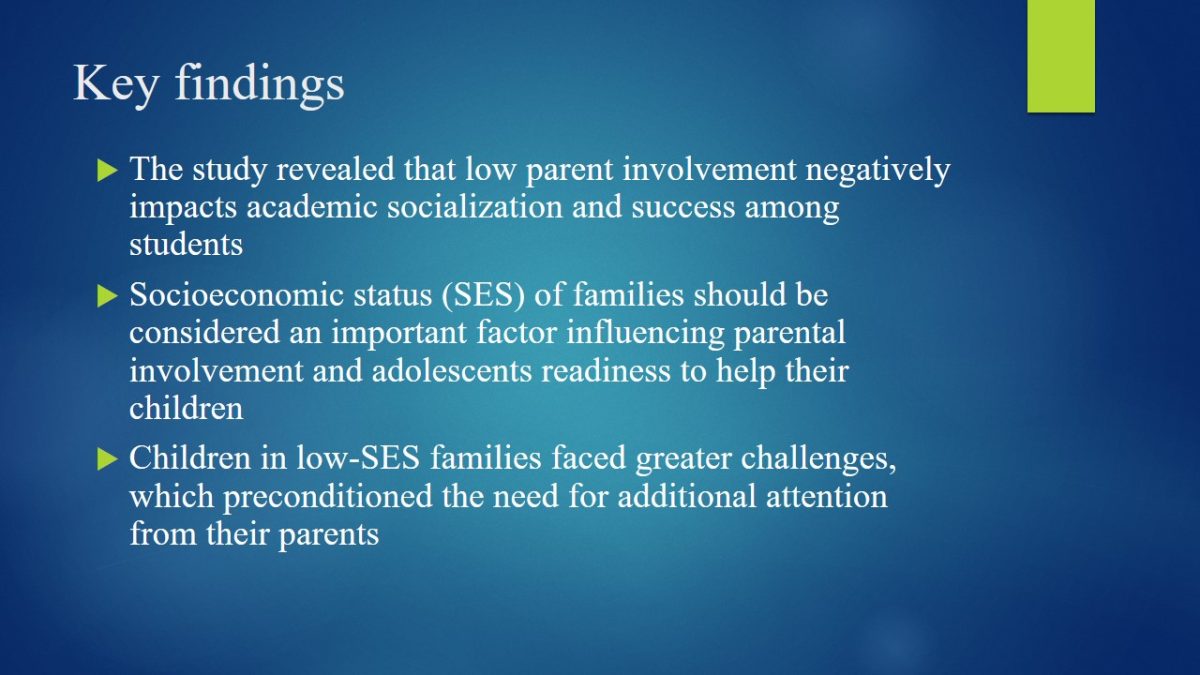
Lv, B., Zhou, H., Guo, X., Liu, C., Liu, Z., & Luo, L. (2016). The relationship between academic achievement and the emotional well-being of elementary school children in China: The moderating role of parent-school communication. Frontiers in Psychology, 7, 948. Web.
- Purpose: To analyze the relationship between academic achievement and the emotional well-being of elementary students impacted by parent involvement.
- Hypothesis: The academic achievement of elementary school students are positively correlated with positive affect and negatively correlated with negative affect.
- Research question: Whether parent involvement can help to attain better academic successes by promoting emotional well-being.
- Approach: Mixed.
I think it is an important study as t aims at analyzing the academic achievement of students regarding their emotional well-being. The use of a mixed approach can be viewed as the strength of this paper as it helps to investigate factors related to the problem and conclude about its current state. Additionally, I liked the fact that the researchers offer another perspective on investigating parent involvement and their role in helping children to succeed.
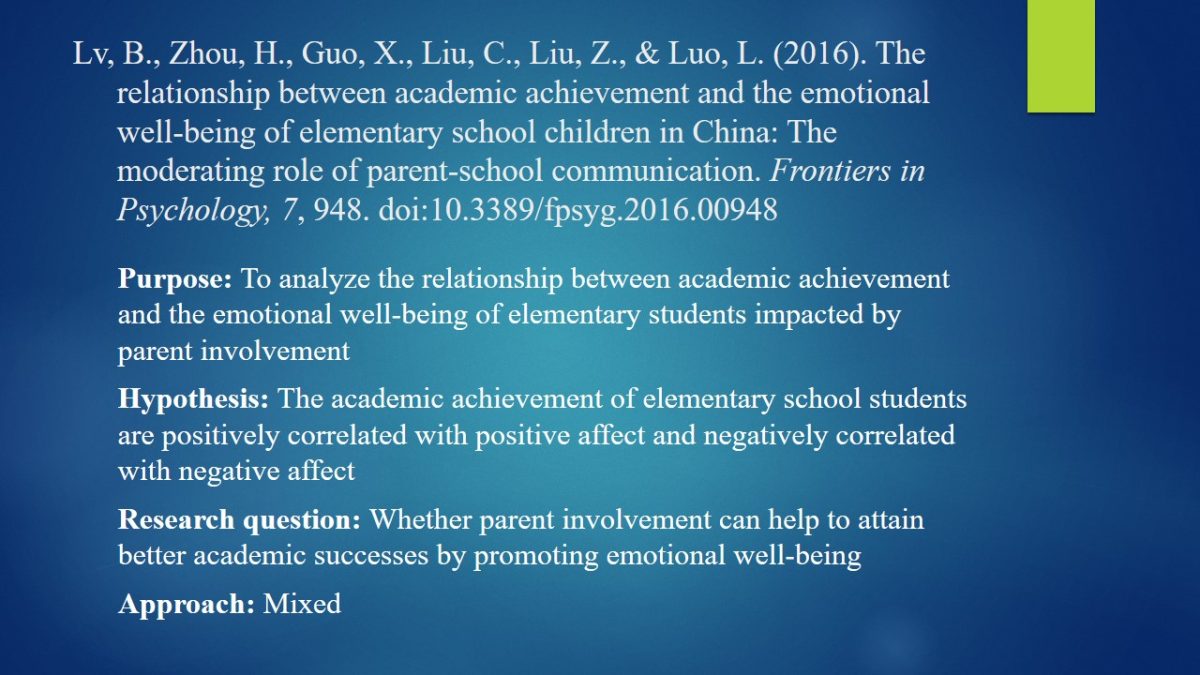
Participants, Settings, Measures
- Participants: 419 elementary school students and their parents took part in the research.
- Settings: Elementary schools of China and students’ households.
- Measures: The study aimed at measuring academic achievement, parent-school communication, and parent involvement levels.
The major measurements included the academic achievement of students and parent-school communication, which is critically important for an improved understanding of the issue. I think that the authors managed to select the right focus of the study and use effective data collection tool to work with 419 school students. The utilization of the given approach can help to acquire topical and relevant data linked to the problem and acquire its improved understanding, which is critical for the project and its outcomes.
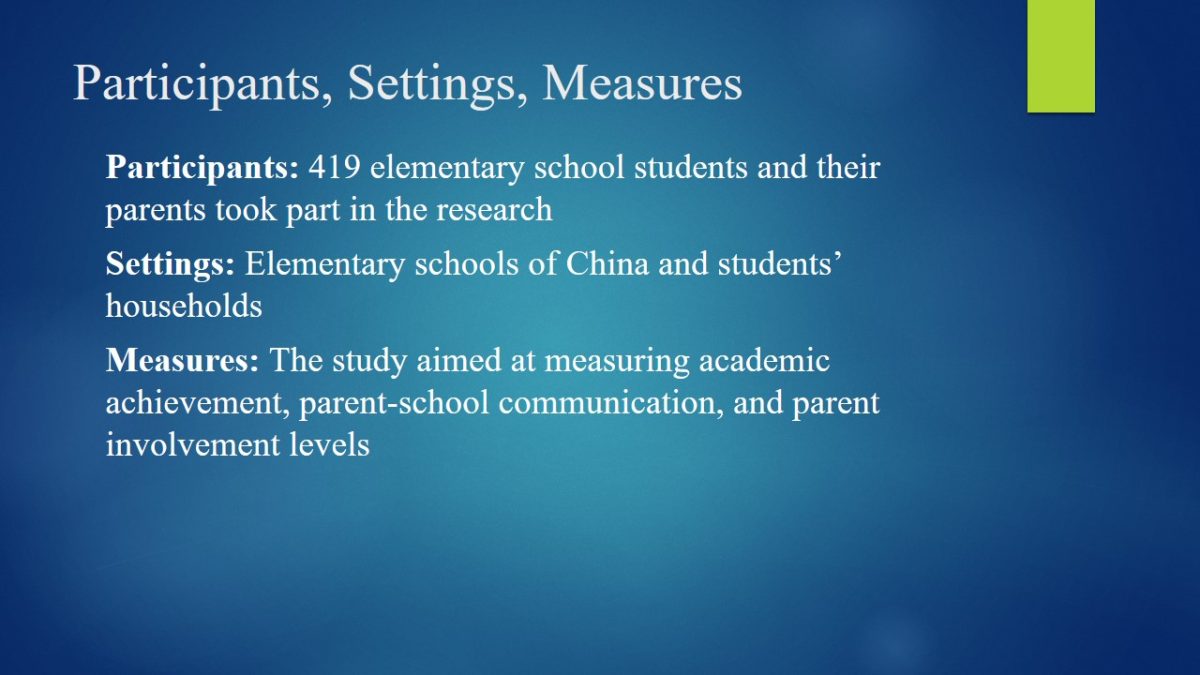
Key findings
- Parent-school communication was an important component for achieving academic successes and improving outcomes of elementary students.
- Higher levels of parent involvement served as the guarantee of enhanced academic successes and children’s readiness to engage in academic activities.
- Academic achievement and the emotional well-being were closely related, which meant that parent involvement acquired the top priority as the method to cultivate the given factor.
I think that the main findings provided by the authors are vital for the investigation of the selected problem from different perspectives. The authors concluded that academic achievement and emotional well-being were closely related. It means that parental involvement should play another important function, which is to ensure that children will have no issues in the emotional sphere and be ready to conclude their education by communicating with teachers and peers.
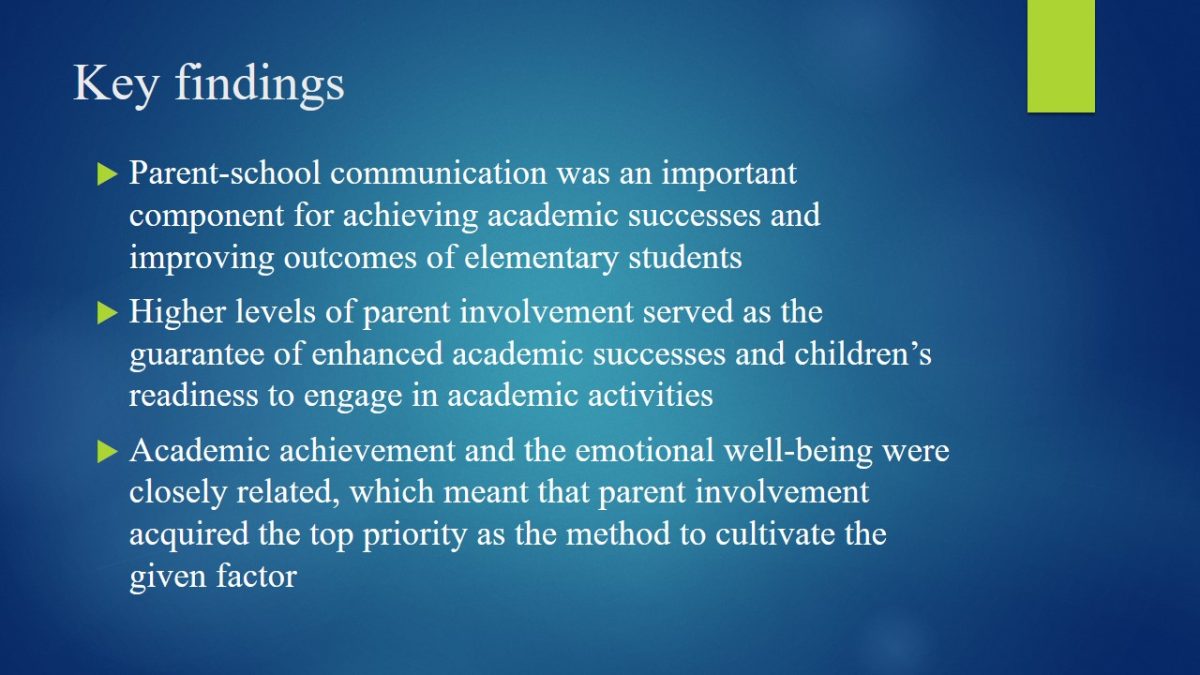
Park, S., Stone, S., & Holloway, S. (2017). School-based parental involvement as a predictor of achievement and school learning environment: An elementary school-level analysis. Children and Youth Services Review, 82, 195-206. Web.
- Purpose: To evaluate the relationship between student achievement and learning environment regarding the parent involvement.
- Research question: Whether parent involvement can be viewed as a predictor of achievement and school learning environment.
- Approach: Qualitative.
I think it is critically important to consider sources that offer another or contradictory perspective on the discussed issue. For this reason, the given paper was selected as the source suggesting some disputable issues and making us think about the necessity of additional interventions to attain improved outcomes and guarantee that children will benefit from appropriate environments at homes and in schools. I also liked the idea that parental involvement can serve as the predictor of achievement; however, some other factors should also be considered.
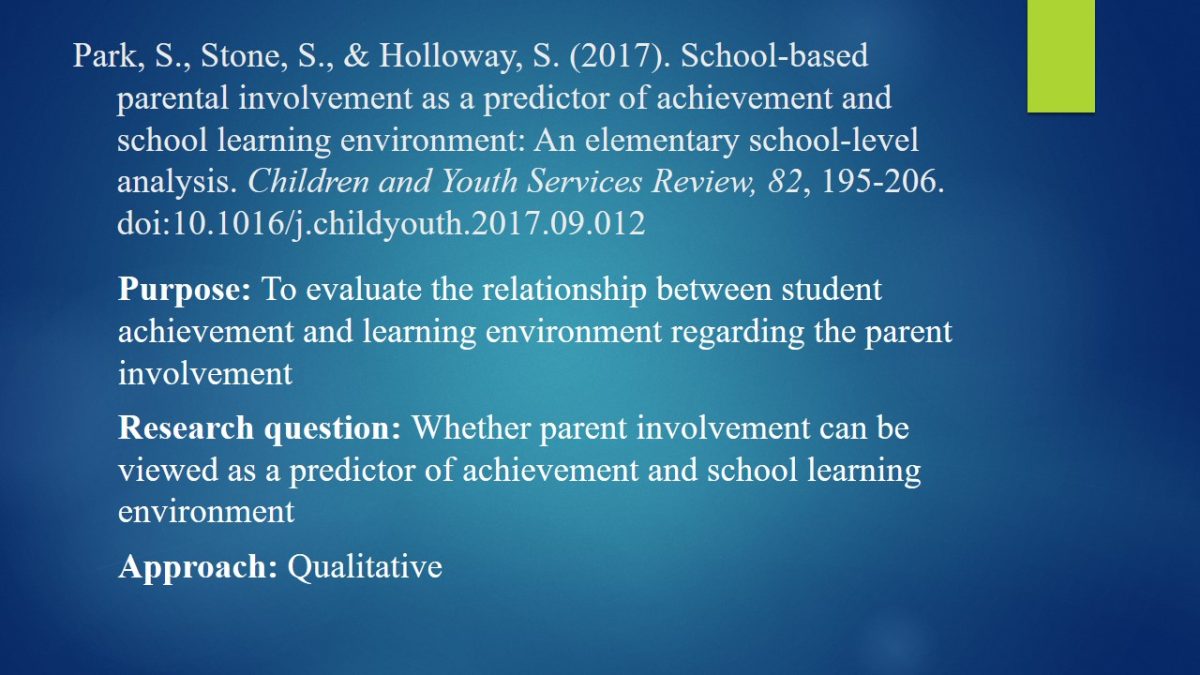
Participants, Settings, Measures
- Participants: Data of 21,409 students from 914 public schools and 363 private schools was used.
- Settings: Private and public elementary schools in the USA.
- Measures: School-level achievement, school-level environment, parent involvement.
The authors used statistical information of 21,409 students, which demonstrates the scope of the study and its focus on the achievements of credible results. I also liked the idea that the given data was used to prove the idea that school-level environment is the factor that depends on multiple aspects, including parent involvement, but, at the same time, the given dimension has low flexibility, which means that there is need for some effort to change the current setting and attain positive outcomes.
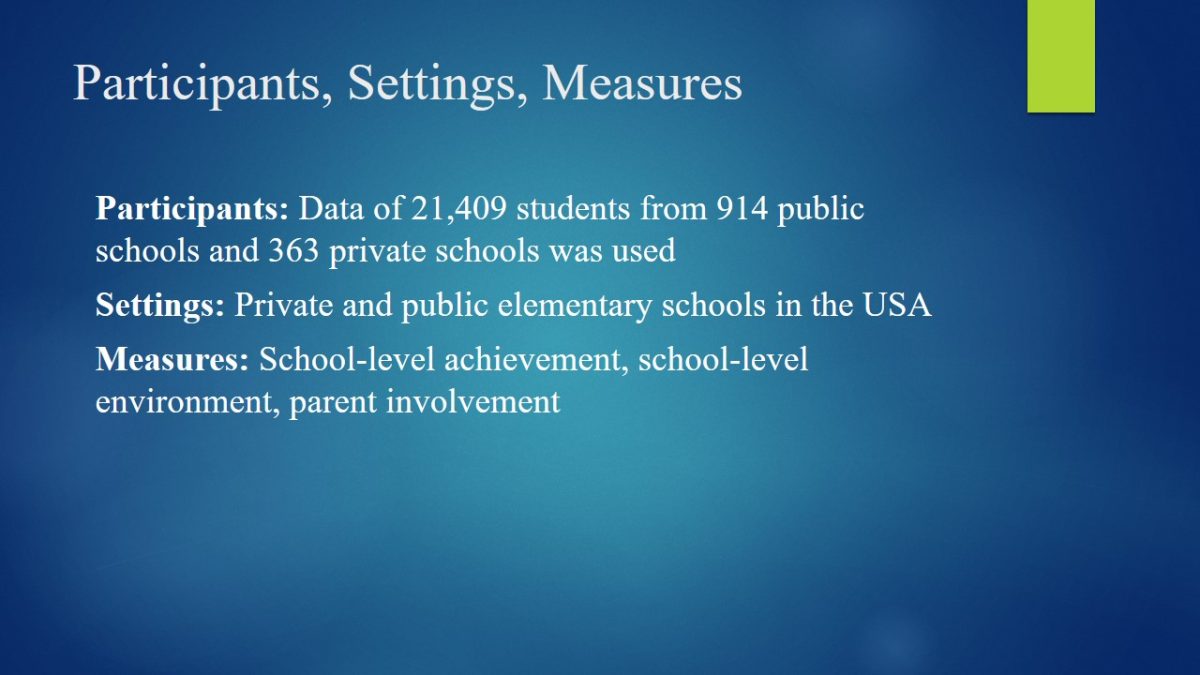
Key findings
- Parent involvement remained a critical factor in promoting the academic successes of children in elementary schools as adults might help them directly.
- However, the ability of parents to impact the climate of schools remained limited because of the absence of tools and mechanisms for intervention.
- Better interventions demanded specific investment and can be linked to the socio-economic status of families, which might impact achievement and outcomes.
The findings prove that regardless of the accepted idea of parent involvement’s importance, there are also some aspects that should be considered to ensure that children benefit from the high level of family participation. In this regard, the school environment and setting, as well as the socio-economic status of households, acquire the top priority as the forces that also influence students and result in the improvement or deterioration of their academic achievements.
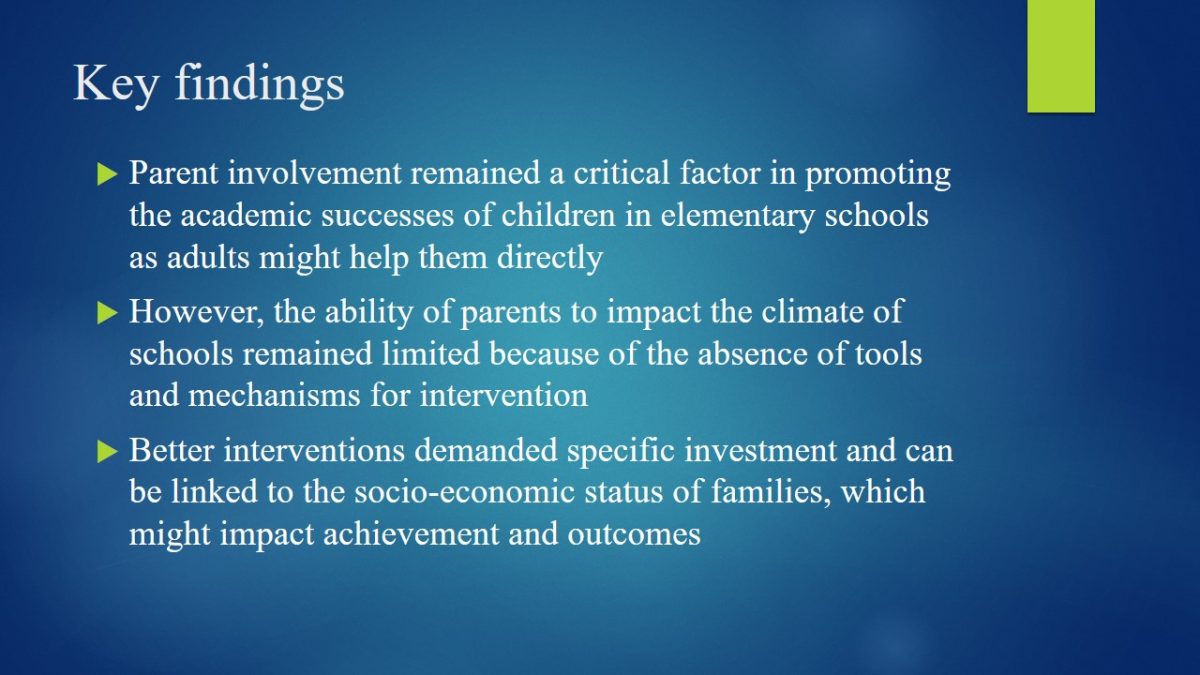
Literature Review Synthesis
- Major ideas: All analyzed articles emphasized the critical importance of parental involvement as one of the major tools that could help children to attain better success and improve their achievements. Moreover, the authors admitted the positive impact of this factor on other aspects, such as behavior, well-being, and motivation.
- Differences: There was an idea that better parental involvement might demand improved socio-economic status as it will serve as the facilitator of better achievements.
- Implications: Each selected article proved the need to view parent involvement as one of the significant factors affecting young learners and their achievements. For this reason, the acquired information can be used for projects revolving around the topic with the primary goal to create the theoretical background for the discussion.
Altogether, I think that the selected papers prove the idea that parental involvement remains a critically important factor that influences the academic successes of young learners and their ability to succeed in elementary school. The current body of evidence shows that the majority of researchers accept the positive correlation between the investigated aspects and outline the necessity to make parents interested in their children’s studying and outcomes. Only under these conditions, it is possible to create a beneficial environment and guarantee that young people will be motivated to succeed in their future life.
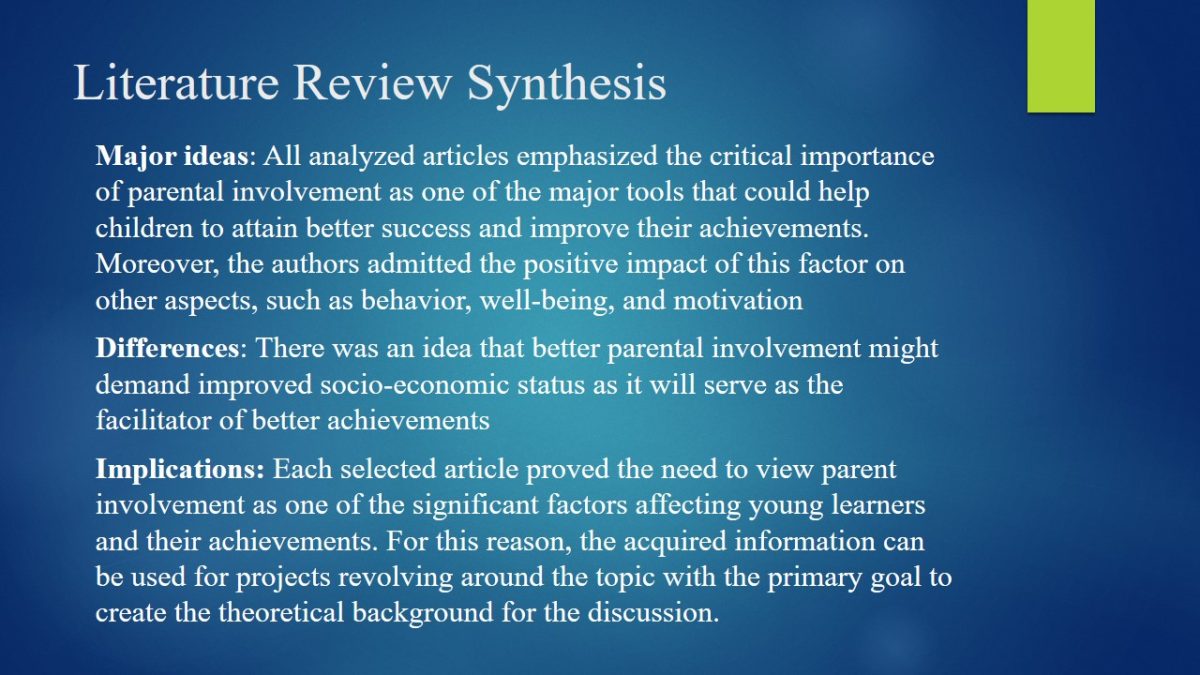
References
Duan, W., Guan, Y., & Bu, H. (2018). The effect of parental involvement and socioeconomic status on junior school students’ academic achievement and school behavior in China. Frontiers in Psychology, 9, 952. Web.
Lara, L., & Saracostti, M. (2019). Effect of parental involvement on children’s academic achievement in Chile. Frontiers in Psychology, 10, 1464. Web.
Lv, B., Zhou, H., Guo, X., Liu, C., Liu, Z., & Luo, L. (2016). The relationship between academic achievement and the emotional well-being of elementary school children in China: The moderating role of parent-school communication. Frontiers in Psychology, 7, 948. Web.
Park, S., Stone, S., & Holloway, S. (2017). School-based parental involvement as a predictor of achievement and school learning environment: An elementary school-level analysis. Children and Youth Services Review, 82, 195-206. Web.